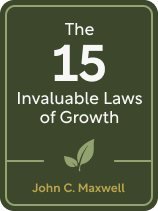

This article is an excerpt from the Shortform book guide to "The 15 Invaluable Laws of Growth" by John C. Maxwell. Shortform has the world's best summaries and analyses of books you should be reading.
Like this article? Sign up for a free trial here.
Do you expect to grow as you go through life? How do you think growth happens?
John C. Maxwell understands that growth operates by certain laws. One of those laws—the Law of Intentionality—says that growth doesn’t just happen by itself; it happens when you make it happen. You have the power to grow by planning strategically and taking thoughtful action.
Read on to learn why thoughtful action helps you on your journey of personal growth and to discover four ways to take thoughtful action effectively.
The Law of Intentionality
Maxwell argues that making a commitment to growth is necessary because growth can happen only intentionally—not accidentally. This is the Law of Intentionality. Many people make the mistake of expecting to grow automatically throughout their lives. Because of this, they never intentionally improve themselves; then, they wind up dissatisfied with how their lives turn out.
Making a commitment to your growth and taking the first steps to follow through on that commitment is a launching point for your personal growth journey. From there, to realize your potential, Maxwell says you’ll have to act on that commitment over the long term by taking thoughtful action. This means planning challenges and opportunities for improvement in your life—and consistently rising to meet them.
Why Taking Thoughtful Action Helps You Grow
Thoughtful action has two components: strategy and consistent follow-through. First, you’ll strategically plan the course of action you’ll take to progress toward your goals. Then, you’ll consistently follow through on your plans by making a daily habit of pursuing your goals. Let’s explore how each of these components contributes to growth.
Strategic Planning Increases Productivity
The strategic planning component of thoughtful action helps you grow because it helps you be more productive. When you strategize effectively, you make tactical choices about how your time, effort, and resources are best spent. You then devote yourself to the opportunities that will actually help you achieve your goals. As a result, you won’t waste your time and energy on unnecessary challenges.
(Shortform note: Strategizing can help you make wise investments, but life is unpredictable—beyond being strategic, you’ll have to be adaptable if you want to continue productively pursuing your goals. Adaptability is about correcting your course when you realize that something you’re doing—or planning to do—isn’t going to work anymore. If your circumstances change and one of your goals suddenly seems impossible, adaptability allows you to determine what is possible and revise your plans—or, if necessary, the goal itself—accordingly.)
Consistent Follow-Through Demands Concrete Effort
The consistent follow-through component of thoughtful action helps you grow because it involves making a concrete, consistent effort to accomplish your goals. Recall that Maxwell says you can only grow intentionally, not accidentally—if you want to achieve something, you have to take real action toward it. And, when you consistently act on your intention to grow, you’ll make slow but steady progress toward realizing your potential.
(Shortorm note: While Maxwell focuses on how consistent effort carries you toward your goals, it’s also beneficial in those situations where you don’t accomplish your goals, in several ways. First, in Keep Going, Austin Kleon explains that the process of pursuing a goal is more fulfilling than achieving the goal. Focusing on the consistent steps along the way to your goal will help you feel about how you spent your time—regardless of the result of your effort. Second, effort doesn’t necessarily lead to success—uncontrollable life circumstances and social structures also play a role in what you’re able to achieve. If you’re sure you did what you could to pursue your goals, you’ll more easily avoid unnecessary self-blame, guilt, or shame when things don’t go your way for reasons you can’t control.)
| Taking Thoughtful Action Builds Resilience Beyond productivity and concrete effort, thoughtful action—and the continual challenges it requires you to face—yields resilience, or the ability to bounce back from failures. In The Obstacle Is the Way, Ryan Holiday argues that resilience is necessary to success in life, because things inevitably get hard. You must be able to persevere through tough times and failures. According to Holiday, you build resilience by dealing with life’s challenges head-on—resolving to accomplish whatever you’ve set out to accomplish, no matter what life throws your way. When you persist in the face of adversity, you teach yourself that you’re capable of doing hard things and boost your confidence in your ability to withstand, and move on from, even the most daunting challenges. |
How to Take Consistent Thoughtful Action
Now that we’ve explained how thoughtful action can help you make progress toward your goals, we’ll share some of Maxwell’s tips for ensuring that your thoughtful action is both maximally productive and consistent.
Method #1: Make Short-Term Sacrifices
Maxwell argues that when you take thoughtful action, you must be willing to make short-term sacrifices to achieve long-term goals. He says that every decision you make has an opportunity cost—to succeed, you have to make smart choices about what you’re willing to lose now in order to win later. For example, if you want to become more physically fit, you might have to exchange convenient, frozen foods for healthier, fresh foods and spend money on a gym membership.
(Shortform note: Here, Maxwell’s talking about the importance of delayed gratification—your ability to deny yourself satisfaction now so that you can reap a better reward later on. Delaying gratification can be hard—it requires both impulse control and faith that you’ll eventually receive the promised reward. You can bolster this sense of faith, and therefore your ability to delay gratification, by setting up regular reward intervals alongside your thoughtful actions. For example, if your goal is to go to the gym every weekday, planning to reward yourself every Saturday may help motivate you to follow through.)
Method #2: Set Yourself Up for Success
When you’re thinking about how to reach a given goal, Maxwell recommends that you allow yourself twice the time, energy, and resources you think you’ll need. This practice gives you extra room for any challenges you may encounter on your way to the goal, so you’ll be more able to overcome them and, therefore, more likely to succeed.
Additionally, by allowing extra time, energy, and resources, you create two possible outcomes: Either you avoid running out of these things before reaching your goal, or you “beat your estimate.” Either way, you bolster your commitment: either by preventing feelings of discouragement and frustration that would make you give up or by boosting your morale with a “win.”
(Shortform note: What should you do with these extra resources if you beat your estimate? You might be tempted to reinvest those resources into another project, but remember that rest is productive, too—you need time to recharge your body and your brain so that you can perform optimally when you’re actively pursuing your goals. When you find yourself with extra time, money, or energy on your hands after a job well done, sometimes the best thing to do is relax and enjoy your success.)
Method #3: Stay Motivated
Maxwell says that, if you keep yourself consistently motivated to accomplish your goals, you’ll find it easier to take steady, thoughtful action. He suggests two ways to increase your motivation:
1) Come up with as many “whys” as you can—your reasons for pursuing personal growth, which should be based on your values, passions, and aspirations.
2) Be accountable to yourself and others. Concretely, this could mean keeping written track of the progress you make toward your goals or recruiting people in your life to check on your progress.
Method #4: Practice Self-Discipline
According to Maxwell, if you want to take thoughtful action consistently, you’ll have to practice self-discipline: following through on your intentions, no matter how tempted you are to do otherwise. This can help you be more consistent by enabling you to overcome the occasional bout of low motivation—you’ll keep moving forward even when you don’t particularly feel like it.
To develop your self-discipline, Maxwell says you should train yourself to pursue growth habitually. For example, if you want to learn Portuguese, you might develop the habit of listening to audio lessons every time you cook. According to him, making a habit of your thoughtful actions takes the guesswork out of how to pursue your goals because you have an automatic process.
| Practical Steps for Improving Self-Discipline Self-discipline isn’t easy for most people since, according to psychologists, it requires you to prioritize logical decision-making over emotional decision-making. In other words, you have to be able to do what you know is best for you in the long term, even if you don’t feel like doing it right now. To improve your self-discipline, experts recommend these methods: Practice mindfulness. Studies show that mindfulness—the practice of paying attention to what you’re experiencing without trying to change it—can train you to endure uncomfortable feelings. This makes it easier to exercise willpower because it helps you de-prioritize your emotions: Even if you don’t enjoy doing what you need to do, you’ll know that you can get through it. Identify and remove temptations. Temptations are things that feel emotionally satisfying in the moment but run counter to your long-term goals. By removing them, you decrease the risk that they’ll distract you—and appeal to your emotional side—when you’re deciding on the right thing to do. For example, if you’re working on your health, you might eat less junk food if you stop buying it. |

———End of Preview———
Like what you just read? Read the rest of the world's best book summary and analysis of John C. Maxwell's "The 15 Invaluable Laws of Growth" at Shortform.
Here's what you'll find in our full The 15 Invaluable Laws of Growth summary:
- Why personal growth is essential to living a meaningful life
- How to build strong character and live with integrity
- How to envision, commit to, and pursue meaningful goals






